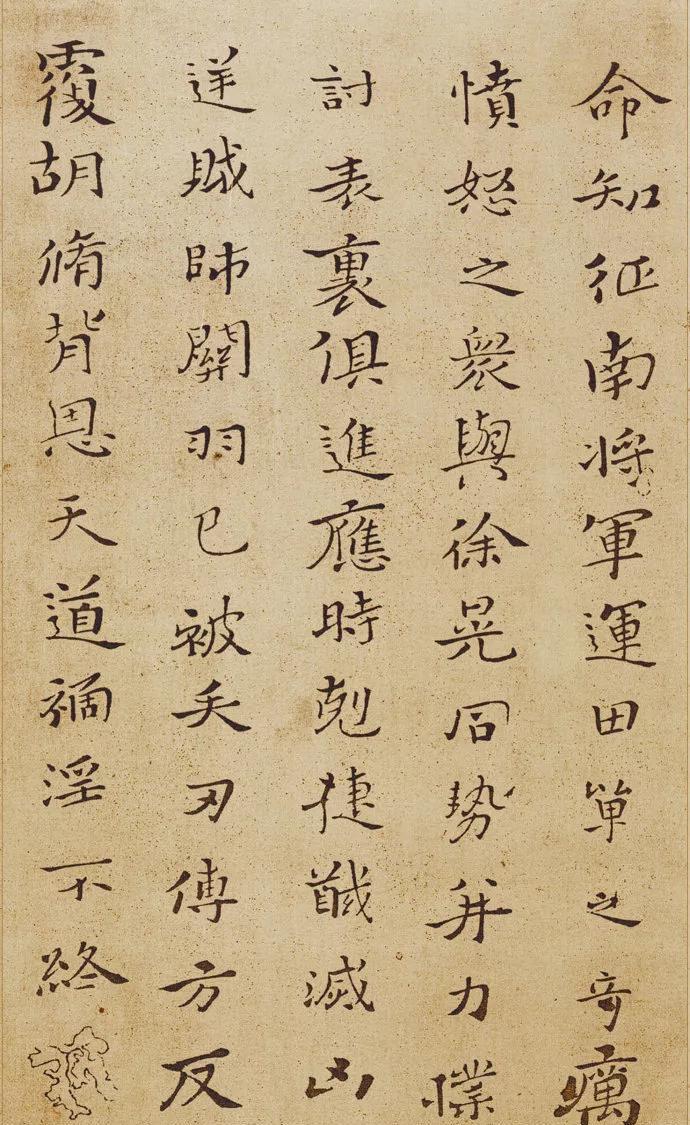Wei Zhongxuan (魏钟繇), courtesy name Yuanchang, was a native of Yingchuan Changshe (present-day Changgedong, Henan). He was born in the first year of the Eastern Han Dynasty Huan Emperor Yuan Jia and died in the fourth year of the reign of Emperor Taihe of Wei (151-230 AD) at the age of 80. Zhong Xuan was one of the important ministers who assisted Cao Wei in starting a business and establishing a country. During the Three Kingdoms period, he guarded Guanzhong and played an important role in Cao Cao's unification of the north. After the founding of the Wei Dynasty, he also made great contributions to the construction of the government of officials. Guan zhi Taifu (官至太傅), known as Zhong Taifu (钟太傅). Zhong Xuan is a calligrapher with a lofty status and great influence in the history of Chinese calligraphy. Together with Zhang Zhi, Wang Xizhi and Wang Xianzhi, they are collectively called the "Four Sages" in the book, and together with Wang Xizhi, they are called "King Zhong". He was in the period of transformation from Lishu to Kaishu, and made a significant contribution to the final formation of Kaishu, and was known as the "ancestor of the main book." His characters are quaint and natural, dense and deep, and are described by Emperor Wu of Liang as "the clouds and cranes swimming in the sky, and the crowds playing the sea." Zhong Xuan is good at the three-body book, namely the Lishu (Mingshi Book), the Kaishu (Articles of Association) and the Xingshu (Xingbao Book, Xiangwen Book), "the three laws are all good to the world" (Yang Xin language). His calligraphy liu de rose and changed. Tang Zhang Huaihuan said: "The Yuan Chang True Book is wonderful, but it is too much of a teacher. Rigid and soft, there are many different interests between dot paintings. It can be described as deep and endless, more than quaint, since the Qin and Han Dynasties, only one person. ”

"He Jie Table" is also known as "He Jie Jie Table", "Rong Road Table", "Rong Ru Table". The content is a report written when it was learned that The Shu general Guan Yu had been captured and killed. The book was written in the twenty-fourth year of the Eastern Han Dynasty (219 AD). It was written by Zhong Xuan when he was 68 years old, and is the most representative work of his later years. The table has not yet departed from the meaning of the lishu, or this asana is what Yang Xin called the "eight-point method".
The courtiers said: Travel both the road and the road, and take risks and brave the cold. Subjects have no responsibilities, do not get subordinates, look up to suspense, and have no peace. On the same day, Chang Shi was arrested and ordered to know that the general Yun Tian Dan was strange, and the angry crowd was on the same side as Xu Huang and vigorously attacked. The appearance is progressive, the response is to be keijie, and the fierce rebellion is extinguished. The thief Guan Yu has been bladed. Fu Fang repeatedly, Hu Xiu betrayed grace, and the Heavenly Dao was evil and promiscuous, and he did not end his life. Feng Wen Jiaxi, overjoyed. Looking at the road with laughter, enthusiastic and relaxed. The courtiers are overjoyed, and I would like to pay tribute to the cheap smell. The courtiers were sincerely frightened, and they were the first to bow their heads and commit capital crimes. On the ninth day of the leap month of the twenty-fourth year of Jian'an, the Marquis of Dongwuting of Nanfan was raised.